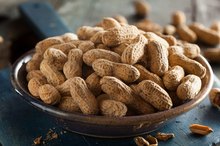Pepperoncini Nutrition
Pepperoncini, also called Tuscan peppers, golden Greek peppers and sweet Italian peppers, are a small, sweet variety of pepper, although they do impart a hint of spiciness 2. These 2- to 3-inch-long vegetables often find use as a pickled pepper, and you can purchase them fresh or jarred in grocery stores.
Calories and Macronutrients
A three-pepper serving of pepperoncini contains 5 calories. When making these peppers part of your meal plan, be sure to limit the total calories per meal to 300 to 600, depending on your calorie needs. Pepperoncini does not contribute fat to your diet, nor does it contain protein. Your should include 46 to 56g of protein in your daily meal plan, so be sure to incorporate this macronutrient into your diet -- consider serving pepperoncini with chicken or beef. Three pepperoncini contain 1g of carbohydrates. To adequately meet your energy needs, supplement your meal plan to ingest 130g of carbohydrates daily.
- A three-pepper serving of pepperoncini contains 5 calories.
- Your should include 46 to 56g of protein in your daily meal plan, so be sure to incorporate this macronutrient into your diet -- consider serving pepperoncini with chicken or beef.
Vitamins
The Nutritional Value of Turkish Apricots
Learn More
Consuming a serving of pepperoncini provides you with 4 percent of the daily recommended intake of vitamin C. This vitamin, most commonly known for its role in preventing the common cold, helps prevent cell damage. Note that cooking may diminish vitamin C content, so for the highest levels of vitamin C, eat pepperoncini raw 1. One serving of pepperoncini also offers 2 percent of the vitamin A you need each day. This vitamin helps maintain your eyesight and improve night vision, as well as influencing the health of your skin and teeth. A review published in the December 2010 "Cochrane Database of Systematic Reviews" notes that vitamin A fed to children may reduce their risk of developing measles and diarrhea -- consider adding pepperoncini to your children's diet to help them get more vitamin A.
- Consuming a serving of pepperoncini provides you with 4 percent of the daily recommended intake of vitamin C. This vitamin, most commonly known for its role in preventing the common cold, helps prevent cell damage.
Minerals
Pepperoncini's vitamin C content helps your body absorb iron, which is useful considering a serving of pepperoncini also contributes 2 percent of the iron you need each day. This essential mineral helps regulate cell growth and oxygen delivery throughout your body. The World Health Organization reports that iron deficiency is the most common nutritional deficiency worldwide. Not getting enough iron in your diet may result in fatigue and increased risk of infections.
- Pepperoncini's vitamin C content helps your body absorb iron, which is useful considering a serving of pepperoncini also contributes 2 percent of the iron you need each day.
- Not getting enough iron in your diet may result in fatigue and increased risk of infections.
Benefits
How Many Calories in Carrot Sticks?
Learn More
Three pepperoncini contributes 1g of fiber to your diet. Fiber, a type of carbohydrate, may reduce your chances of developing constipation, as well as more serious medical conditions such as diabetes and heart disease. Your daily meal plan should include 20g of fiber or more -- Harvard School of Public Health reports that most Americans consume only 15g.
Considerations
Jarred pepperoncini can contain moderately high levels of sodium -- 360 to 390mg per serving. The American Heart Association recommends limiting sodium consumption to 1,500mg per day, although research presented at the American Society of Nephrology’s 2010 Annual Meeting and Scientific Exhibition warns too little salt in the diet may present problems, as well. Older adults may face an increased risk of bone fracture if their diets do not include enough sodium.
Related Articles
References
Writer Bio
Nicki Wolf has been writing health and human interest articles since 1986. Her work has been published at various cooking and nutrition websites. Wolf has an extensive background in medical/nutrition writing and online content development in the nonprofit arena. She graduated with a Bachelor of Arts in English from Temple University.









